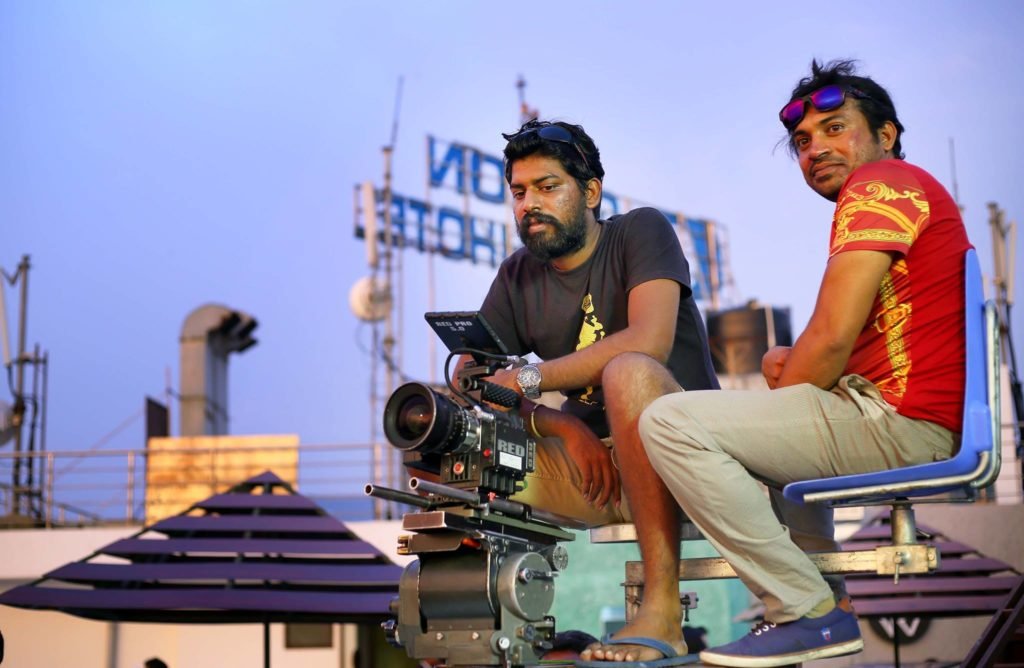With his shirt sleeves folded back mid-arm to just cover the tattoo of four roadway arrows on his right hand that perhaps show his love for machines and travelling, he sits for the interview with absolute grace. No one else is in the frame – not even the interviewer – as he answers questions about his career and his then most recent film, CIA: Comrade in America (2017) which stars his close friend Dulquer Salmaan. He has never played the lead in a film yet, and now even when he is at the center of a frame, he only exudes humility. Hinting at the secret to his rise in Malayalam cinema. This is the story of actor Soubin Shahir and his unmatched charm that has enhanced the appeal of comedy in Malayalam films since 2013.
Born and brought up in a household where one parent was a film production controller, it was a mix of passion and predilection towards cinema since childhood that made Shahir decide that that was going to be his bread and butter. With a dream of directing a film, at around the age of 18 he entered the industry with raw energy, mild support, and a twinkle in his eye.
More Than 17 Years in Cinema
For someone who has just started watching Malayalam movies, Soubin Shahir may seem like any other comedy actor. Who enters the industry with a breakthrough role after flourishing in a less glittery industry like that of theater or mimicry, enjoys their period, and then slowly fades into oblivion. Much like comedian Bijukuttan who broke into the Tinseltown after appearing in an Asianet weekly skit called Five Star Thattukada in the mid-2000s, enjoyed his halcyon days from 2008 to 2010, and then struggled for many years before reappearing in smaller roles. Shahir’s case is slightly different. He never wanted to be an actor. He is, in fact, afraid of it.

Soubin Shahir began his career as an assistant director, first associating with director Fazil in late 2001 for the 2002 box office bomb Kaiyethum Doorath starring his friend and future frequent collaborator Fahadh Faasil. While he also played a tiny role in the film, no one noticed his presence – neither in front of the camera nor behind. Everyone associated with the film dispersed to think things through while Shahir continued assisting directors. At the time, the Malayalam film industry faced a huge slump, only to be revived by the rise of the new wave in the early 2010s. More than 13 years later, he would be a part of this wave and play a key role with his co-star to create the best Malayalam movie of 2016.
Although his fear of acting was aggravated by the 2002 debacle, his discomfiture didn’t prevent Rajeev Ravi from trying something out.
Scattered Beginnings
It was in cinematographer Ravi’s directorial debut Annayum Rasoolum (2013) that Shahir first played a considerable character. A shady guy who does odd jobs to earn a living, watching it today in retrospect clearly shows his rookie acting. The film was, therefore and however, more known for its raw style and a raunchy sequence involving Fahadh Faasil and Andrea Jeremiah.
A few more films happened in the next two years before he landed the breakthrough in 2015 when Alphonse Puthren asked him to play a college professor.
Facebook-il Indo?
Comedy films in Malayalam work largely because of the dialogues and their delivery. While Shahir’s role in writing is minimal to non-existent, he samples one-liners and improvisation to create an impact.
His first memorable dialogue was actually a ‘dubbing filler’, the boon and bane of Malayalam cinema. It is a two-word remark that Shahir’s character – a super extra – blurts out at the speed of light when the protagonist walks by in the segment Kullante Bharya in the anthology film 5 Sundarikal (2013). Like a typical Kerala loverboy, the character asks “Facebook-il indo?“, meaning “Are you on Facebook?” which summarizes the basic theme of the short. Shahir cannot be seen while he is uttering it, but it was enough to make the crowd chuckle.
To have freedom and confidence to experiment with this type of jest in films intended for a mainstream audience is a privilege. Which Shahir credits to his friendship. He is close friends, and even spent few years living with, Amal Neerad, who helmed Kullante Bharya, Iyobinte Pusthakam (2014), and CIA: Comrade in America.
More quotable dialogues and appearances came when Puthren released Premam in May 2015. Originally sought as an actor to play a professor who teaches a serious subject, it was decided three days before the shoot that Shahir would play a PT master (physical trainer) instead. And he smashed it.

One iconic scene that really got the Malayalam film viewers talking was the scene involving Renji Panicker. While most of the talking is being done by Panicker and Maniyanpilla Raju in that scene, what people also remember is Shahir’s timely whistling just after the former finishes his high-octane retort. It’s a classic Malayalam film scene with the background score borrowed from Shaji Kailas’s 1994 hit crime thriller Commissioner and composed by Rajamani.
Premam was an influential film and helped enhance and start the careers of a lot of yesteryear actors. Shahir’s was just one of them. But there’s an important reason why PT master Shivan and his performance clicked with the audience. Premam was entirely directed and edited by Puthren himself, which meant that he had seen all the shots. And it was his decision to add Shahir’s expressive face as he blows air into his whistle, making the scene all the more appealing. Had it been another conventional film crew, Shahir would have to wait for Crispin, the Photoshop expert, to arrive to get his stars aligned…
Soubin Shahir has himself revealed to Manorama in the interview how most of his comedy should be credited to the writers who ask him to say the words exactly how they want it to be and the editors who add it in the final reel. He has uttered a lot of funny remarks in a lot of films, but most of them have got lost in the editing room. Premam, thankfully, was not one of them.
Soubin Shahir, the Performer
Malayalam film comedy is largely characterized by slapstick and horseplay. When you think of comedy, for instance, of the golden era of Malayalam cinema, you think of Mazha Peyyunnu Maddalam Kottunnu (1986) or Aram + Aram = Kinnaram (1985). Although jest had a big role to play in them, horseplay was the primary driver of laughter. And the difference between jest and horseplay is in the quality of the comedy. A type of forceful infestation of dialogues in the script so that viewers don’t get bored of all the peripheral drama was the key substance in these films. Today, the type has changed to situational comedy and character-based improvisation. Of which Soubin Shahir is a pioneer.
So, when a man comes in who can say things in a comical way without putting much effort and without being in the focus of a frame, people indeed take notice and giggle. Because the Malayali audience largely go to the movies to laugh and be entertained. In that regard, Shahir is a kingly performer. For instance, again take the example of Premam, where Vinay Forrt plays a meatier role than Shahir. Yet, it is Shahir’s idiosyncratic character that is more striking even though comedy is equally supplied by both. Dialogues like “Simple aayitolla step enikya arriyilla, Sir” (“I don’t know simple dance steps”), delivered as part of a conversation are what contributed to his breakthrough.
When an actor can showcase his portrayals as effortless, it automatically makes them a better performer. Shahir, who thinks acting is easier than direction, has had to take several takes in films such as Premam and Maheshinte Prathikaaram (2016). His dubbing routines have been tiresome as it is difficult to clone an accent when one has spoken another for more than 30 years. If one looks at a few sequences in Maheshinte Prathikaaram, the Crispin character flushes with embarrassment. Shahir says that those are natural expressions, a result of being embarrassed in front of the whole crew.
The mark of an experienced actor is said to be their ability to stay in a character. Shahir, on the other hand, rushes at his job. He is afraid and shy of acting, evident in some of his sequences, and works harder in the dubbing room instead.
The Rising Parameter
Effortless comedy almost never goes unnoticed, but what waters the plant is the writing. Comedy is only as good as the writing, and Soubin Shahir’s rise in Malayalam cinema should be credited to the writers who write his films.
Syam Pushkaran wrote Maheshinte Prathikaaram, and it was his idea to add the ‘kummattikka juice’ song. Although the song, “Juice juice juice, kummattikka juice! Mammootty-ikya ishtapetta kummattikka juice!” is a Kochi export whose variation young kids use to sing in the 80s and 90s, it became popular only when the trailer of the film was uploaded on YouTube on 11 January 2016, less than a month before the film’s release – enough for people to take notice, sing along, and wait for the scene when watching the full product later. In the interview, he also jokes that after the film’s release he even felt like he was the brand ambassador of ‘kummattikka juice’ (watermelon juice).
While Premam triggered Shahir’s rise, it was the Crispin character that really swayed the boat. People who knew him began to use the film’s references while talking to him. There’s even an incident where Mammootty himself used the reference to congratulate Shahir.
Hero’s Friend
In CIA: Comrade In America, Shahir plays Joemon, a close friend of Salmaan’s character Ajjippaan. While the comedy is intact here, how it is different from his previous movies is in the writing. There’s a scene where Ajjippaan highlights the presence and importance of family members and close friends in his life. When a hero says something like that, the audience subconsciously think about these characters and the actors who play them. So, Salmaan’s fans automatically become their fans. And that’s where Shahir actually rises in and out of the screen.

Soubin Shahir is every man’s comedian. He is close friends with most of the veterans he has worked with, and that definitely improves his appeal. Being in the industry for more than 17 years definitely has its benefits, but Shahir maintains that he has never requested a chance in a film. His focus always has been direction. And in September 2017, it happened. His name appeared beside ‘direction’ on the credits roll.
Using the Director’s Megaphone
Most debut directors prefer to take a foolproof approach to directing, using a safe story to start their career. Shahir depended on his personal experience and imagination and aimed for the sky, literally. His debut feature film, Parava, opened on 21 September 2017 to critical acclaim. Narrating the story of two streetwise friends from the rough lanes of Mattancherry, Kochi, Parava focused on the unusual competition of pigeon flying. A very rare combination of novelty and charm, the film was based on real-life events that Shahir had experienced as a child loafing around in Kochi with his friends while his other friends paid attention to their teachers at school.

A below-average student, Soubin Shahir was mostly caught up in sports and theater in his teenage, never satisfying his teachers or parents when it came to studies. Following a hard yet successful try at a Bachelor’s degree, supported by his father who sensed talent for mimicry and mono-acting in his son, Shahir entered the Malayalam ‘padam’ business. (Interestingly, it is only after a while that Shahir and his elder brother understood that all the props that their father used to bring home were from the film sets he worked in and not from Dubai.)
From an assistant director who helmed rainy sequences in films in 2002, it definitely has been a long road to the director’s chair. The connections and exposure that Shahir amassed through the decade and a half of his career so far trickled down to Parava’s craft. Critics mostly used superlatives to describe the film, with Lensmen reviewing it as a “compelling emotional tale.”
Even while working on his dream, Shahir was occupied with acting work in films such as Martin Prakkat’s Charlie (2015), Sameer Thahir’s Kali (2016), Rajeev Ravi’s Kammatipaadam (2016), and Khalid Rahman’s Anuraga Karikkin Vellam (2016). These would help him cement his position as a rising comedian, with the media even comparing him with Aju Varghese and other contemporaries like Salim Kumar and Suraj Venjaramoodu.
Glory After Parava
Parava flew as Shahir dreamed, but he was only starting up. The next logical step was to work on another project. But, instead of direction, which most audience still do not associate him with, he pumped up his acting credits. Playing small roles in films – with an average of 3 films a year since 2013 – improved the confidence in Shahir, who likes to think of himself as a better director than actor.
Five years after his actual debut, long-time friend and producer-director Thahir and cinematographer Shyju Khalid would cast him in Sudani from Nigeria, his first film in a starring role. The closest he came to acting in a lead role previously was in Aneesh Upasana’s 2016 dull comedy, Popcorn, opposite his bestie Srinda.
Sudani from Nigeria, which also stars Nigerian actor Samuel Abiola Robinson, opened to critical and commercial success. According to critics’ aggregated score, it quickly surpassed some of the biggest hits of 2018 so far including Venu’s Carbon, Prajesh Sen’s Captain, and Kamal’s Kamala Surayya biopic Aami. Social media scrambled to praise Shahir’s and Robinson’s performances, writer-director Zakariya’s warm take on the power of kindness and harmony, and the overall feel of the film. If Popcorn can be considered a one-off affair that didn’t work out, then Sudani from Nigeria definitely reinforced Shahir’s talent as an actor.
Malayalam cinema hardly pays attention to films that have new or lesser-known actors in the lead. Zakariya’s debut uses a mixture and still hits gold. Only inferring the rise of Soubin Shahir, a refined Malayalam actor and director, who is about to take the industry by storm. Or, maybe, already has.
Sudani from Nigeria opened in Kerala on 23 March 2018.
(All images, including the featured one, copyright of Soubin Shahir and associated photographers, sourced from Facebook.)

4 responses to “The Rise and Rise of Soubin Shahir”
The background score in the scene from Premam that is mentioned is actually from the movie Commissioner.
Yes. Thank you for correcting it. I have updated it in the article.
[…] and then compare it with another having lesser-known actors like Sreenath Bhasi, Shane Nigam, and Soubin Shahir. Even though the quality of a film eventually decides its success rate, such viral social media […]
[…] wave’ had already reached the Kerala coast and would quickly encapsulate the industry. The rise of Soubin Shahir from a small-time comedian to a top-billed actor and a successful director is a small example, a […]